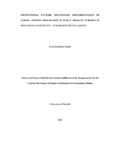| dc.description.abstract | Food is essential towards giving nutritional supplements to school-going children. The application of the School Feeding Program reliefs in reinforcing the nutritional status of school-going children as well as alleviating short-term hunger in malnourished children. This is to ensure increased the access to basic education across the republic. The study sought to explore the institutional factors that influenced the implementation of school feeding programme in primary schools in Matungulu Sub-county, Machakos County. The study was led by the following research questions: How does the head teachers’ training, the community’s involvement, support by the national Government and the engagement of Board of Management committees influence the application of school feeding programme in public primary schools in Matungulu Sub-county? The researcher used descriptive survey research design. A representative sample of respondents was drawn from the target population using probability and non-probability sampling. The research instruments used in the study were questionnaires that were developed by the researcher and pilot tested to ensure validity. Head teachers, teachers, parents and pupils in Matungulu sub-county formed the population of the study. Data was collected from 19 schools through questionnaires administered to 19 head-teachers, 38 teachers, 57 parents and 76 out of which 19 head teachers, 38 teachers, 38 parents and 57 pupils successfully answered. The quantitative data collected was analyzed using descriptive statistics (percentages, frequencies and pie charts). Qualitative data obtained through open-ended were organized into themes guided by research questions and presented in frequency distribution tables graphs. The key findings of the study were that the national government needed to put more effort to ensure continuity in the SFP all-through the year. Training of the stakeholders was also determined as a vital way of ensuring the successful enactment of the school feeding programme. It was also clear from the study that the school management committees and the local communities had vital roles to play in the successful implementation of the school feeding programme. Altogether, the study also established that the challenges facing the implementation of the SFP needed to be solved through the active involvement of all the stakeholders.The key findings of the study were that training and 4 of the head teachers on the school feeding programme from the table 4.5, the support from parents as represented in 4.11,the support from school management committee and national government on table 4.6 led to the success of the implementation of school feeding programme. | en_US |



